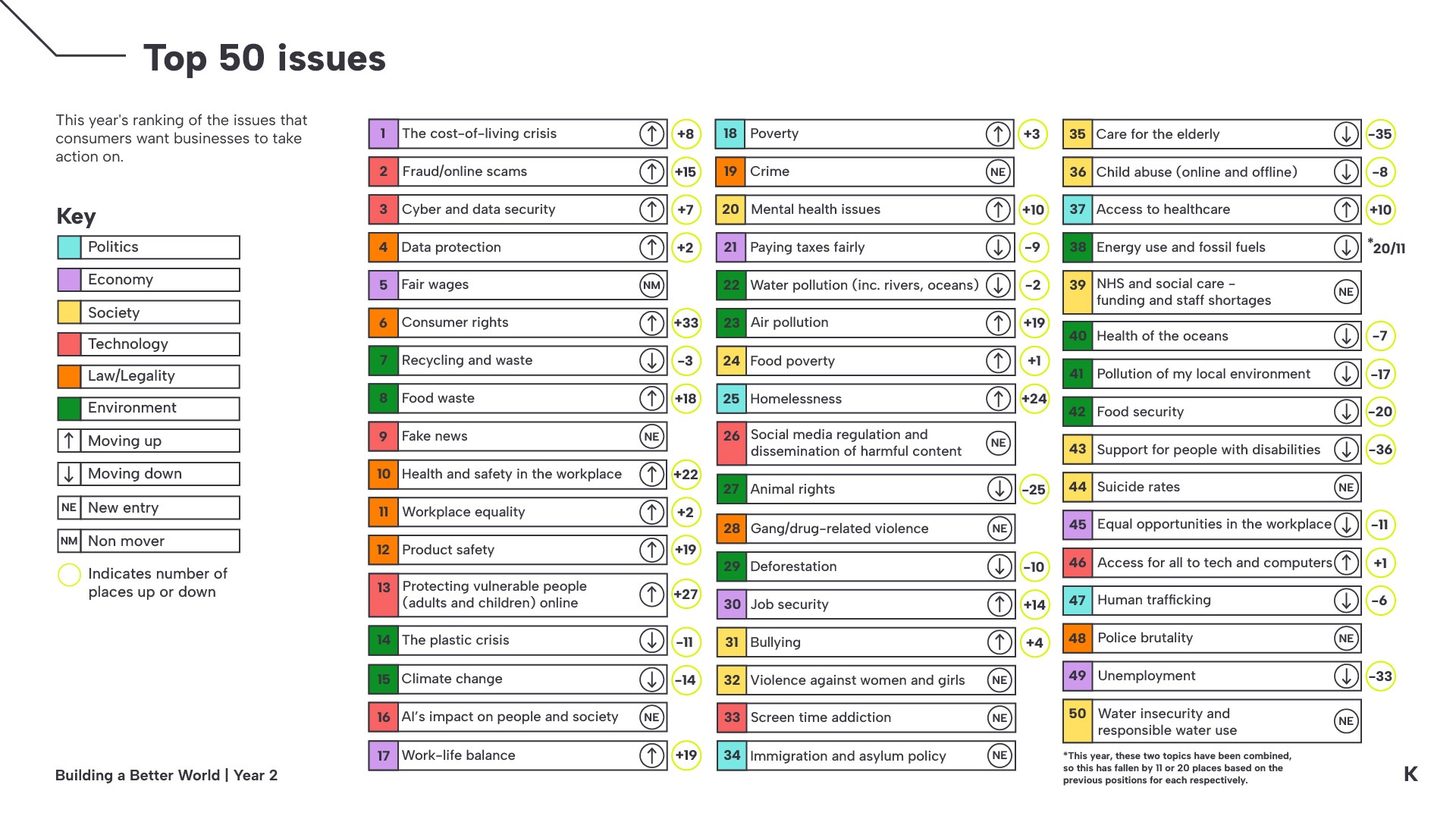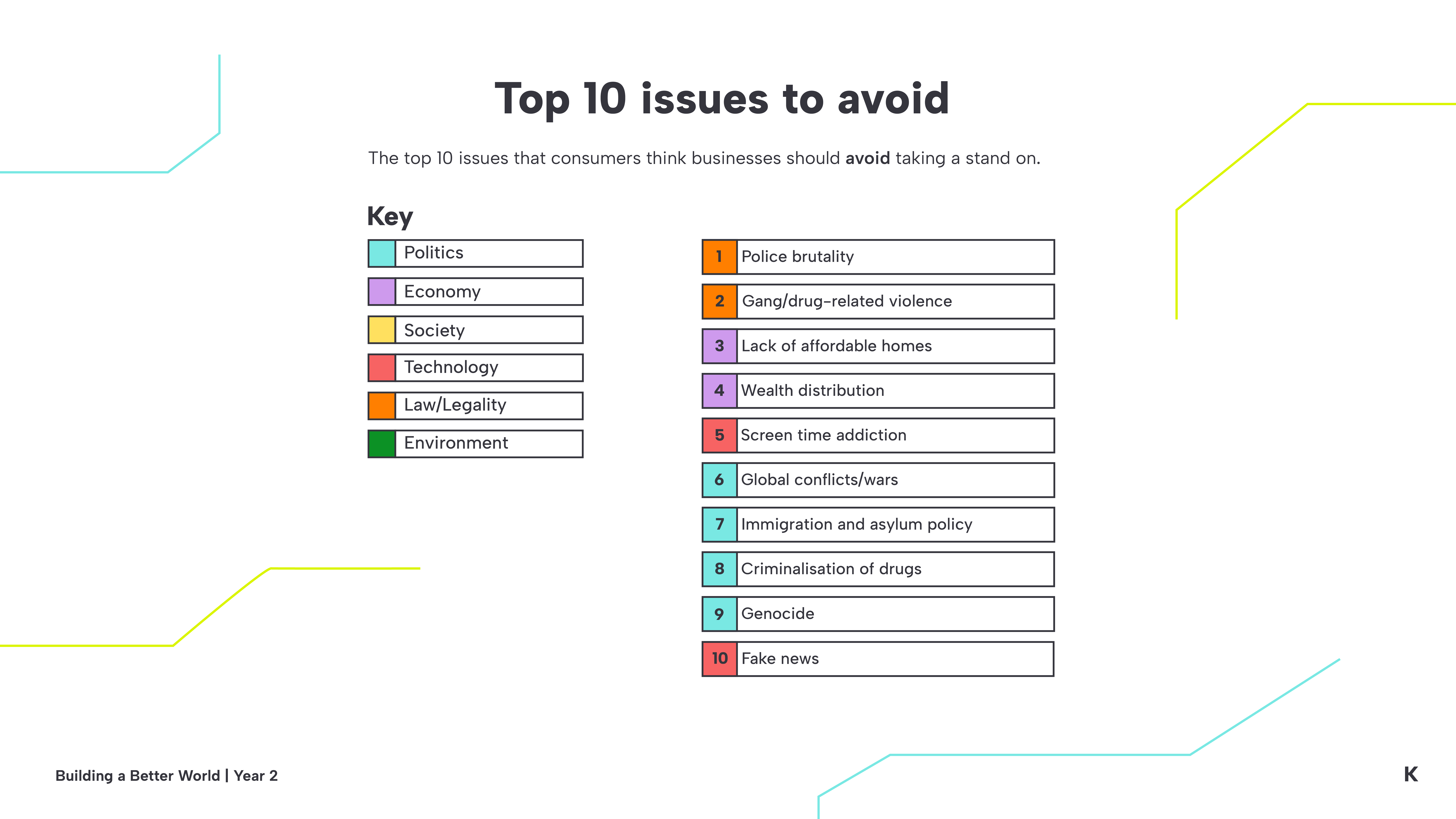The world is increasingly polarised.
A King’s College London and Ipsos study released this month found an increase in public perception that culture wars are dividing UK society. The flag movement that emerged across our towns and cities this summer points to stark signs of division. Plus, outgoing BBC director general, Tim Davie, referenced “living in increasingly polarised times” in his resignation speech.
Against this backdrop, it was no surprise to us that polarisation was a key theme in our recent Building a Better World research report.
We asked the public about the issues they wanted businesses to act on, and the issues they felt businesses shouldn’t step in on. Some of the same issues appeared on both lists, including fake news, gang and drug-related violence, and immigration policy.
The research also showed big shifts in the top issues people wanted businesses to act on, in comparison to the first time we ran this research in 2024. Cost of living surged to the top of the rankings from #9 last year, while climate change plummeted from the top spot to #15. New concerns are rising, such as AI which made its debut at #16.
These shifts and polarisation are understandably spooking brand leaders when it comes to purpose-led comms.
We spoke to 250 marketing and comms leaders as part of our research. Although 95% of them agreed that brands should act on issues, 69% said polarisation had dampened their organisation’s appetite to take a stand, with 24% citing risk of controversy as their biggest barrier to action. There’s a real fear of saying the wrong thing, which is leading to many brands and organisations saying nothing at all.
We’re calling this purpose paralysis.
Purpose paralysis isn’t just a risk for people and planet. There’s a commercial cost too, as 79% of the marketing and comms leaders we spoke to said they believed brands that act on issues will be more successful over the next five years.
Meanwhile, 32% of consumers said they’d started buying from a brand in the last year because of its stance on purpose.
As a purpose-led agency, we know and work with many brands and organisations that recognise the opportunity purpose presents for people, planet and profit — even in these challenging times.
Five of them contributed to our report:
- Holly Holder from Wildfarmed stressed the importance of balancing provocation with accuracy to maintain trust in purpose.
- Lucy Hamilton from Talisker gave her insights into how to build a purpose that’s rooted in a brand truth.
- Abby Lewis-Miller from Girlguiding showed how a brand can provide a powerful platform for those with lived experience of the cause you want to champion.
These leaders continue to push ahead on purpose. Their approach may have evolved in response to societal changes, but their mission stays the same.
Brands can overcome purpose paralysis and continue to make a difference. If we listen to and learn from the public, and each other, we can all adapt and navigate a polarised landscape with care and clarity.
Now is not the time to do nothing, it’s the time to be bolder and braver.
Kindred’s Building a Better World report features tips to tackle purpose paralysis:
- Find your thing. A consistent cause that is aligned with your brand values and one you can deliver a real impact on over time.
- Understand the culture you’re operating in. Make sure your language, tone and expression fit the moment.
- Engage stakeholders and build internal confidence. Gain support for a cause by bringing people along the journey and make sure it is weaved through everything you do.
- Be transparent. People value honesty and can easily spot greenwashing and ‘issue-hushing’. Be clear about your objectives. Don’t shy away from the need for improvement.
- Plan for polarisation. Taking a stand will always invite some controversy. Expect it and prepare accordingly.
If you enjoyed this article, sign up for free to our twice weekly editorial alert.
We have six email alerts in total - covering ESG, internal comms, PR jobs and events. Enter your email address below to find out more:







